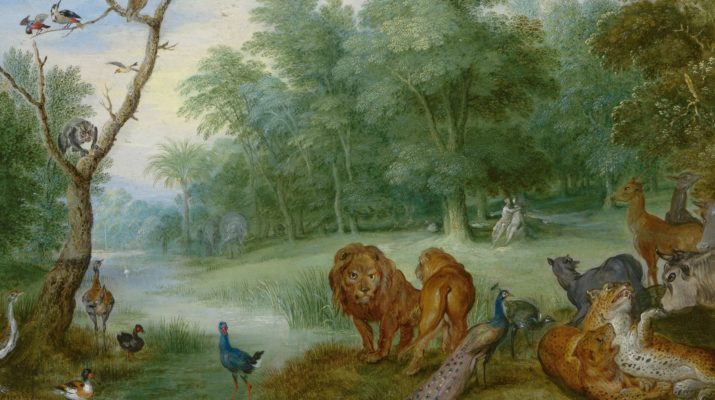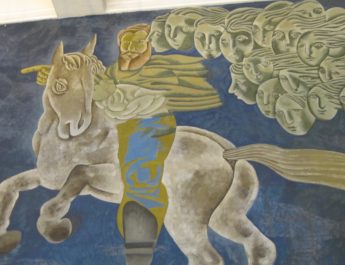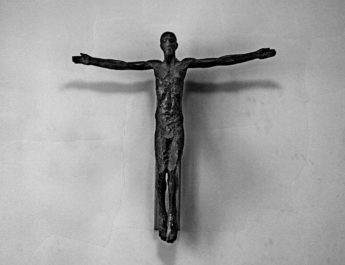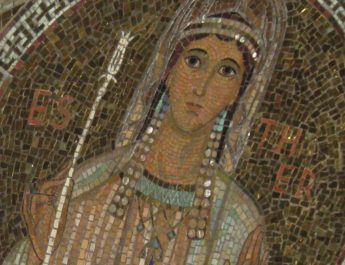Isaiah 51:1-6
Ordinary A39
1 ListenA to me, you that pursueB righteousness,C
you that seekD the Lord.E
A “listen” = shama. This is to hear, call, consent, or consider. It implies listening intelligently, giving attention, and, because of these two factors, obedience and action are often implied.
B “pursue” = radaph. This is to chase after, pursue, hunt, or persecute. It is running after someone or something, generally with hostile motives.
C “righteousness” = tsedeq. This is rightness, righteousness, vindication. It is everything that is just or ethical. That which is right in a natural, moral, or legal sense. It also includes just weights (i.e. true weights). Figuratively, this is justice, righteousness, equity – even prosperity.
D “seek” = baqash. This is to seek, ask, desire, or request. It can be any kind of searching. It can also mean to worship or pray – implies a striving for.
E “Lord” = YHVH. From havah (to be, become) or hayah (to come to pass, become, be). This is the name of the God of Israel, the self-existent and eternal one, the tetragrammaton. This pronunciation has been lost to time so “Lord” is generally used in its place.
LookF to the rockG from which you were hewn,H
and to the quarryI from which you were dug.J
F “look” = nabat. This is to behold, look at intently, consider, or scan. It can mean to have respect or regard someone favorably.
G “rock” = tsur. From tsur (to confine, cramp, or bind in a literal or figurative sense; to besiege, assault, or distress). This is rock, tone, cliff, boulder, rocky. It can also be a refuge, a way to refer to God.
H “hewn” = chatsab. This is to hew or cut material like wood or stone. It can also be to dig, quarry, split, or engrave.
I “quarry” = maqqebeth + bor. 2x in OT. Maqqebeth is from naqab (to pierce, bore holes, puncture; to make a hole more or less forcefully; also to curse or libel). This is literally something that perforates like a hammer or the piercing like a hole or excavation. Bor is from bur (to bore; figuratively, to explain, examine, or clear up). This is a pit – generally a cistern or dungeon. It could also be a well or fountain.
J “dug” = naqar. 6x in OT. This is to bore, dig, pick, gouge, pick out, quarry, or penetrate. It is used for gouging out eyes, having eyes pecked out, and a quarry being dug.
2 Look to AbrahamK your father
and to SarahL who boreM you;
for he was but one when I calledN him,
but I blessedO him and made him many.P
K “Abraham” = Abraham. From the same as Abiram (exalted father, a high father – lofty) {from ab (father literal or figurative) + rum (rise, bring up, being high, extol, exalt, haughty; to raise in a literal or figurative sense)}. This is Abraham, father of many nations or father of a multitude.
L “Sarah” = sarah. From the same as sarah (princess, mistress, noble lady, queen); from sar (chief, ruler, captain, official, prince). This is Sarah, meaning princess.
M “bore” = chul. This is whirling around so dancing as in a circle or writhing in pain. It is used particularly for the pain of childbirth or from writhing due to fear. It can also be falling in pain or waiting.
N “called” = qara. This is to call or call out – to call someone by name. Also used more broadly for calling forth.
O “blessed” = barak. This is to kneel, to bless. It is blessing God as part of worship and adoration or blessing humans to help them. It can be used as a euphemism to say curse God.
P “made…many” = rabah. This is increasing in any aspect whether quantity, authority, size, quality, greatness, etc.
3 For the Lord will comfortQ Zion;R
he will comfort all her waste places,S
and will make her wildernessT like Eden,U
her desertV like the gardenW of the Lord;
Q “comfort” = nacham. Properly, this is a strong breath or a sigh. This can be to be sorry, to pity, console. Comfort, or repent. But, one can also comfort oneself with less righteous thoughts, so this can also mean to avenge oneself.
R “Zion” = tsiyyon. The word is related to tsyiyyun (signpost, monument); from tsavah (to charge someone, to command, order); from the same as tsiyyah (dryness drought); from a root meaning parched as desert, dry land. Zion can refer to a mountain in Jerusalem as well as another name for Jerusalem itself or the people.
S “waste places” = chorbah. From chareb (to be waste or desolate, destroyer). This is ruin, desert, waste place. Properly, it is a drought, which implies a desolated or decayed place.
T “wilderness” = midbar. From dabar (to speak, command, declare). This is mouth or speech. It can also be desert or wilderness. Additionally, it can be used for a pasture to which one drives cattle.
U “Eden” = eden. 16x in OT. Perhaps from the same as eden (luxury, delight, pleasure); from adan (to luxuriate). This is the garden of Eden and also the name of a Levite.
V “desert” = arabah. From the same as arab (desert plateau, Arabia) OR from arab (to become evening); {from ereb (evening) or from arab (to exchange, give or take on pledge, braid, intermix)}. This is a desert valley or plain, wilderness. Also, the name of a place Arabah.
W “garden” = gan. From ganan (to put a hedge around – generally, protect or defend; to cover or surround). This is a garden in that it is fenced in. It can also be an enclosure.
joyX and gladnessY will be foundZ in her,
thanksgivingAA and the voiceBB of song.CC
X “joy” = sason. From sus (to rejoice, be glad; properly, to be bright or cheerful). This is rejoicing, cheerfulness, and welcome.
Y “gladness” = simchah. From samach (to rejoice, be glad; properly, to brighten up; also used figuratively). This is joy, rejoicing, pleasure, or glee.
Z “found” = matsa. This is to find, catch or acquire. It can also mean to come forth or appear. Figuratively, this can mean to meet or be together with.
AA “thanksgiving” = todah. From yadah (to throw one’s hands into the air in a gesture of praise, to give thanks, or make a confession); from yad (hand, ability, power; hand in a literal sense; what one can do or the means by which one does it). This is properly extending one’s hand, which implies affirmation and adoration. It can be a song of thanksgiving, a choir of thanksgiving, confession, or praise. It can also be a thank offering.
BB “voice” = qol. This is a sound, used often for human voices. Also used when God speaks or angels, animals or instruments. It can be a cry or a noise, thunder or earthquakes and so on.
CC “song” = zimrah. 4x in OT. From zamar (making music; used specially of music to worship God; music with singing, singing praise, singing psalms); may be from zamar (to trim or prune). This is a melody, psalm, or sound. It is sung to praise God or it might be a song sung with an instrument.
4 ListenDD to me, my people,EE
and give heedFF to me, my nation;GG
DD “listen” = qashab. To listen, pay attention to, incline – used in the phrase incline the ears.
EE “people” = am. From amam (to darken, hide, associate; creating shadows by huddling together). This is people or nation. It can be used specifically for a tribe, collectively of troops or armies, or figuratively to refer to a flock of animals.
FF “give heed” = azan. Perhaps from ozen (ear, earing, audience, show; properly, broadness – applied to its ear in reference to its shape). Properly, this is to expand or broaden one’s ear i.e. listen intently, pay attention, heed.
GG “nation” = leom. Root may refer to gathering. This is people, a community, or a nation.
for a teachingHH will go out from me,
and my justiceII, JJ for a lightKK to the peoples.
HH “teaching” = torah. From yarah (to throw, shoot, be stunned; to flow as water so figuratively to instruct or teach). This is law, instruction, teaching, or statute. It can also refer to the first five books of the Bible – the Torah.
II “justice” = mishpat. From shaphat (to judge, defend, pronounce judgment, condemn, govern). This is a verdict or formal sentence whether from humans or from God. It includes the act of judging as well as the place that judging takes place, the suit itself, and the penalty. Abstractly, this is justice, which includes the rights of the participants.
JJ {untranslated} = raga’. 12x in OT. This is to toss violently, break, or disturb. It could be tossed about as on rough sea or the skin breaking out in skin disease. It can mean to shut the eyes and so to settle, east, rest, or quiet.
KK “light” = or. From or (to be or become light). This is light, sun, sunshine, dawn, or daylight. Figuratively, it can refer to light from instruction, light of a face (that is to say one that is cheerful or finds favor). It can refer to prosperity or salvation; a light that guides, a light eternal from Zion.
5 I will bring nearLL my deliveranceMM swiftly,
my salvationNN has gone out
and my armsOO will rulePP the peoples;
LL “near” = qarob. From qarab (to come near, offer, make ready). This is near whether nearby, related, near in time, or allied.
MM “deliverance” = tsedeq. Same as “righteousness” in v1. See note C above.
NN “salvation” = yesha. From yasha (to deliver, defend, help, preserve, rescue, be safe. Properly, to be open, wide or free, which implies being safe. Used causatively, it means to free). This is salvation, deliverance, rescue, safety, welfare, liberty.
OO “arms” = zeroa. Perhaps from zara (to sow, scatter seed, conceive). This is the arm, shoulder, or foreleg of an animal. It is figuratively used for power, force, might, or help.
PP “rule” = shaphat. Related to “justice” in v4. See note II above.
the coastlandsQQ waitRR for me,
and for my arm they hope.SS
QQ “coastlands” = i. Perhaps from avah (to desire, crave, wish for, lust after). This is coastland, island, or region. It is a desirable place to live – dry land, coast.
RR “wait” = qavah. It can mean to bind or gather together, especially in the sense of twisting together. In that light, it can mean collect. Figuratively, this can mean to wait, await, expect, or tarry.
SS “hope” = yachal. This is to wait, which implies patience, hope, and trust. It can also be pained waiting.
6 Lift upTT your eyesUU to the heavens,VV
and look at the earth beneath;
for the heavens will vanishWW like smoke,XX
TT “lift up” = nasa. This to lift in a broad sense, literally and figuratively. So it could be to carry, take, or arise. It could also be bring forth, advance, accept.
UU “eyes” = ayin. This is eye in a literal or figurative sense so eye, appearance, favor, or a fountain (the eye of the landscape).
VV “heavens” = shamayim. Root may mean being lofty. This is sky, the air, or heaven. It is in a dual noun form so this might refer to the part of the sky where the clouds move on the one hand and the part beyond that where the sun, moon, and stars are on the other hand.
WW “vanish” = malach. 5x in OT. This is properly, to pulverize, temper together, dissipate, vanish. It can also mean to season or salt It could be to vanish like dust does.
XX “smoke” = ashan. Perhaps from ashan (to smoke or burn in a literal or figurative sense; to be angry). This is smoke, vapor, dust, or anger.
the earth will wear outYY like a garment,ZZ
and those who liveAAA on it will die like gnats;BBB
YY “wear out” = balah. 17x in OT. This is to grow old, wear out, consume, waste, enjoy, fail, decay.
ZZ “garment” = beged. From bagad (to cover or conceal; figuratively, to act in a covert or treacherous way, to transgress or pillage). This is clothing, garment, robe, or some other kind of clothing. Figuratively, it can be treachery or pillaging.
AAA “live” = yashab. This is to sit and so to remain and so to dwell. It is sitting for any reason – as a judge, in order to ambush, or just sitting quietly. Causatively, this can mean settling or marrying. This can also mean continue, endure, or establish.
BBB Some manuscripts say “in like manner” with no mention of gnats.
but my salvationCCC will be forever,DDD
and my deliveranceEEE will never be ended.FFF
CCC “salvation” = yeshuah. Related to “salvation” in v5. From yasha (see note NN above). This is salvation, deliverance, health, victory, prosperity.
DDD “forever” = olam. This is a long scope of time whether in the past (antiquity, ancient time) or in the future (eternal, everlasting).
EEE “deliverance” = tsedaqah. Related to “righteousness” in v1 & “deliverance” in v5. From the same as tsedeq (see note C above). This is righteousness, justice, righteous acts, and moral virtue.
FFF “be ended” = chathath. This is properly to prostrate. So it could be shatter, break, or break down in a literal, violent sense. It could also figuratively refer to being dismayed, discouraged, or frightened. It can also mean to stand in awe.
Image credit: “Paradise with the Fall of Adam and Eve” by Jan Brueghel the Younger, circa 1630.




